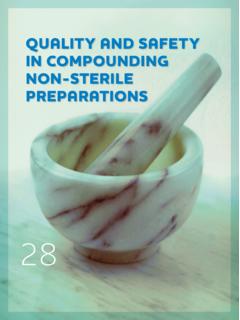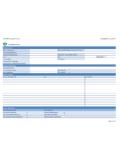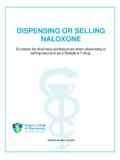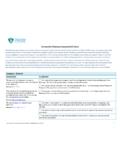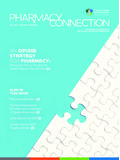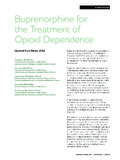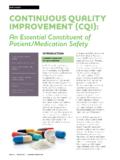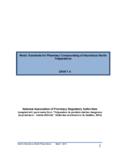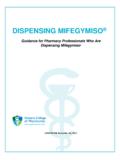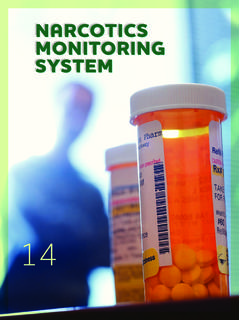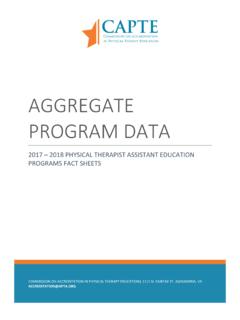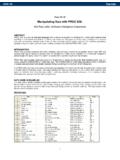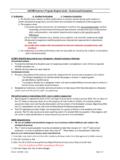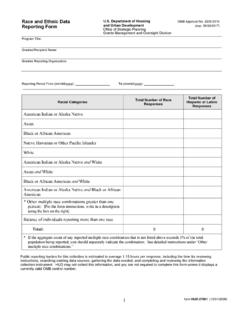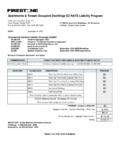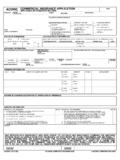Transcription of A Continuous Quality Assurance Program for …
1 PAGE 10 ~ SUMMER 2017 ~ PHARMACY CONNECTIONA Continuous Quality Assurance Program for Medication SafetyFOSTERING A CULTURE OF PATIENT SAFETYPHARMACY CONNECTION ~ SUMMER 2017 ~ PAGE 11 CQAThe CQA Program will support Continuous Quality improvement in all pharmacies and put in place a mandatory, consistent standard for responding to medication incidents. In addition to requiring the anonymous reporting of medication incident data to a third party, the CQA Program will enable pharmacy professionals to learn from medication incidents and better understand why they happened and how they can be prevented. Through aggregate data analysis provided by the third party, the College will also be able to identify areas of risk and provide appropriate guidance to pharmacy approval for implementation follows the March 20, 2017 meeting where Council unanimously supported a framework for a CQA Program and directed the College to begin public consultation to help determine the critical factors to support a successful rollout of the Program .
2 The consultation attracted 89 responses, demonstrating broad support for the development of a mandatory, standardized Program . Feedback received related to the implementation details will inform the College s next steps in regards to development and A SAFETY CULTUREU nderstanding why errors happen can help reduce the risk of recurrence, prevent future incidents, including near misses, and ultimately advance patient CQA Program promotes the principles of a safety culture within pharmacies, similar to what exists in other parts of the health system. It emphasizes accountability and Quality improvement, open reporting of incidents, and opportunities to share learnings with other professionals and organizations to inform pharmacy and system wide improvements. The CQA Program : Enables sharing of lessons learned from medication incidents through reporting, resulting in ongoing process improvements to minimize errors and maximize health outcomes, thereby improving patient safety; Requires shared accountability between operators of pharmacies, for the systems they design and how they respond to staff behaviour, and pharmacy professionals, for the Quality of their choices and for reporting their errors; Emphasizes learning and accountability through developing a culture where individuals are comfortable bringing forward medication incidents without fear of punitive outcomes.
3 And Ensures a consistent approach within the profession towards Continuous Quality improvement (CQI) processes and the outcomes mandatory reporting is a major aspect of the CQA Program , all components of the Program must be implemented together to enhance safe medication June 12, 2017, Council approved Continuous Quality Assurance Program for Medication Safety (CQA) for implementation. The Program will be formally integrated into College operations in a similar manner as other practice standards and 12 ~ SUMMER 2017 ~ PHARMACY CONNECTIONCQAThe required components of an effective standardized Quality Assurance Program for pharmacies address both medication errors that reach the patient as well as near misses that are intercepted prior to dispensing, and must achieve all of the following four elements:REPORT Enable and require anonymous reporting of all medication incidents by pharmacy professionals to a specified independent, objective third-party organization for population of an aggregate incident database to identify issues and trends to support patient safety Require pharmacy professionals to document appropriate details of medication incidents and near misses in a timely manner to support the accurateness of information reported.
4 Document CQI plans and outcomes of staff communications and Quality improvements Necessitate that when a medication incident occurs, pharmacy professionals analyze the error in a timely manner for causal factors and commit to taking appropriate steps to minimize the likelihood of recurrence of the incident. Require completion of an MSSA within the first year of implementation of the Program , then at least every 2-3 years. The Designated Manager may determine an MSSA is required more frequently if a significant change occurs in the pharmacy. Analyze individual and aggregate data to inform the development of Quality improvement LEARNING Require prompt communication of appropriate details of a medication incident to all pharmacy staff, including causal factors of the error and actions taken to reduce the likelihood of recurrence. Ensure the scheduling of regular CQI communication with pharmacy staff to educate pharmacy team members on medication safety, encourage open dialogue on medication incidents, complete a medication safety self-assessment (MSSA), and develop and monitor Quality improvement plans.
5 Support the development and monitoring of CQI plans, outcomes of CQI communications and Quality improvements implemented. PHARMACY CONNECTION ~ SUMMER 2017 ~ PAGE 13 CQANEXT STEPS AND TIMELINESThe College will now move forward with finalizing a comprehensive implementation plan, incorporating the feedback from the consultation and other phased approach for implementation will begin in late fall 2017, involving approximately 100 pharmacies, and will provide an opportunity to assess the Program requirements and incorporate changes and best practices that are identified. An evaluation will be conducted to determine the extent of achievement of the four core elements of the Program in the early adopters, in order to make recommendations to enhance the uptake and sustainability in all pharmacies. The College anticipates that the CQA Program will move forward with full implementation in all community pharmacies by December 2018. The College will also continue working with hospital stakeholders to determine the best way to strengthen current hospital Quality and reporting systems and improve alignment with community systems and CQA Program requirements to gain the benefit of more fulsome data and shared learnings.
6 Updates will be posted to the website as this Program moves forward. Want to Help Establish an Effective Medication Safety Program ?Volunteers Needed!The College is seeking volunteer pharmacies across Ontario for initial implementation and testing of the CQA Program . Training will be provided, including an in-person session, and support ( reference materials, technical help) will be available. This is a great opportunity for you and your staff to get a head start on this requirement and help contribute to establishing an effective reporting system. Please contact if your pharmacy is interested in move towards a standardized medication incident reporting and analysis system is part of larger national and global World Health Organization recently launched their third Global Patient Safety Challenge with the theme of Medication Safety. The overall goal is to reduce the level of severe, avoidable harm related to medications by 50% over 5 years, globally.
7 They specifically note that harm resulting from errors or unsafe practices due to weaknesses in health systems should be addressed. The provinces of Nova Scotia and Saskatchewan have already established medication safety programs , and there continues to be ongoing dialogue among other provinces on establishing their own similar programs .
